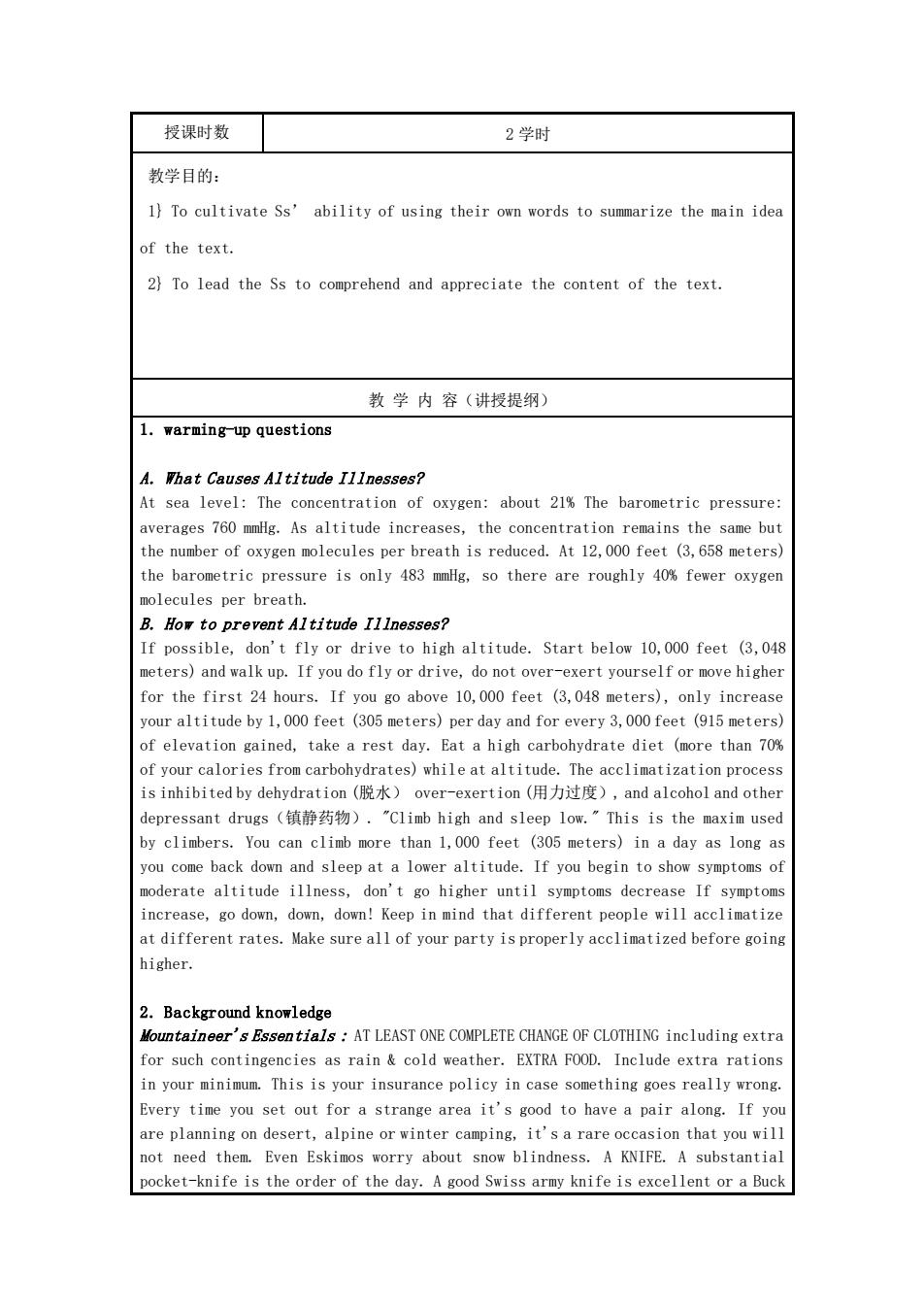正在加载图片...

授课时数 2学时 教学目的: 1)To cultivate Ss'ability of using their own words to summarize the main idea of the text. 2)To lead the Ss to comprehend and appreciate the content of the text. 教学内容(讲授提纲) 1.warming-up questions A.What Causes Altitude IlInesses? At sea level:The concentration of oxygen:about 21%The barometric pressure the number of oxygen molecules per breath is reduced.At 12,000 feet (3,658 meters) the barometric pressure is only 483 mmHg,so there are roughly 40%fewer oxygen molecules per breath. B.How to prevent Altitude IIInesses? don't fly or drive to high altitude.Start below 10.000 feet (3.048 for the first 24 hours.If you go above 10,000 feet (3,048 meters),only increase your altitude by 1,000 feet (305 meters)per day and for every 3,000 feet (915 meters) of elevation gained.take a rest day.Eat a high carbohydrate diet (more than 70% of your calories from carbohydrates)while at altitude.The acclimatization process is inhibited by exertion(用力过度) and alcohol nd othe depressant drugs(镇静药物)."Climb high and sleep low.”This is the maxim used by climbers.You can climb more than 1,000 feet (305 meters)in a day as long as you come back down and sleep at a lower altitude.If you begin to show symptoms of moderate altitude illness,don't go higher until symptoms decrease If symptoms increase,go down,down,down!Keep in mind that diffe erent people will acclimatize at different rates.Make sure all of your party is properly acclimatized before going higher. 2.Background knowledge Mountaineer 'sEssentials:AT LEAST ONE COMPLETE CHANGE OF CLOTHING including extra for such cont tingencies as rain cold weather.EXTRA FOOD.Include extra ration in your minimum.This is your insurance policy in case something goes really wrong. Every time you set out for a strange area it's good to have a pair along.If you are planning on desert,alpine or winter camping,it's a rare occasion that you will not need them.Even Eskimos worry about snow blindness.A kNIFE.A substantial ocket-knife is the order of the day.A good Swiss army knife is excellent or a Buck授课时数 2 学时 教学目的: 1} To cultivate Ss’ ability of using their own words to summarize the main idea of the text. 2} To lead the Ss to comprehend and appreciate the content of the text. 教 学 内 容(讲授提纲) 1. warming-up questions A. What Causes Altitude Illnesses? At sea level: The concentration of oxygen: about 21% The barometric pressure: averages 760 mmHg. As altitude increases, the concentration remains the same but the number of oxygen molecules per breath is reduced. At 12,000 feet (3,658 meters) the barometric pressure is only 483 mmHg, so there are roughly 40% fewer oxygen molecules per breath. B. How to prevent Altitude Illnesses? If possible, don't fly or drive to high altitude. Start below 10,000 feet (3,048 meters) and walk up. If you do fly or drive, do not over-exert yourself or move higher for the first 24 hours. If you go above 10,000 feet (3,048 meters), only increase your altitude by 1,000 feet (305 meters) per day and for every 3,000 feet (915 meters) of elevation gained, take a rest day. Eat a high carbohydrate diet (more than 70% of your calories from carbohydrates) while at altitude. The acclimatization process is inhibited by dehydration (脱水) over-exertion (用力过度), and alcohol and other depressant drugs(镇静药物). "Climb high and sleep low." This is the maxim used by climbers. You can climb more than 1,000 feet (305 meters) in a day as long as you come back down and sleep at a lower altitude. If you begin to show symptoms of moderate altitude illness, don't go higher until symptoms decrease If symptoms increase, go down, down, down! Keep in mind that different people will acclimatize at different rates. Make sure all of your party is properly acclimatized before going higher. 2. Background knowledge Mountaineer's Essentials : AT LEAST ONE COMPLETE CHANGE OF CLOTHING including extra for such contingencies as rain & cold weather. EXTRA FOOD. Include extra rations in your minimum. This is your insurance policy in case something goes really wrong. Every time you set out for a strange area it's good to have a pair along. If you are planning on desert, alpine or winter camping, it's a rare occasion that you will not need them. Even Eskimos worry about snow blindness. A KNIFE. A substantial pocket-knife is the order of the day. A good Swiss army knife is excellent or a Buck